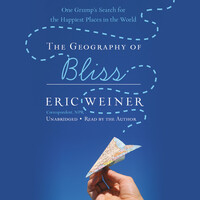You need to sign in or sign up before continuing.
Take a photo of a barcode or cover
558 reviews for:
The Geography of Bliss: One Grump's Search for the Happiest Places in the World
Eric Weiner
558 reviews for:
The Geography of Bliss: One Grump's Search for the Happiest Places in the World
Eric Weiner
I liked the author's style - he describes himself as a grump and he stands by it, keeping an always self-deprecating and critical tone, but funny! Sometimes, I found him a bit overly-critical of the things going on around him, but for the most part this book was enlightening and provided an inside look at parts of the world I'm sure I would never have learned anything about otherwise. Definitely a good book for those open-minded and interested in trying to figure out just what makes us happy.
I don't normally read non-fiction, but I heard a lecture by the author on public radio and was intrigued. The subject itself is interesting, but by far the best part of this book is Weiner's excellent narrative voice. This book is at times funny, insightful and even sad. And sometimes, like India, it is all these things at once.
This book is worth a read, for anyone who has ever wondered what makes people happy, or whether we should even bother wondering about it in the first place.
This book is worth a read, for anyone who has ever wondered what makes people happy, or whether we should even bother wondering about it in the first place.
This book makes me so grateful for the place where I live.
I struggled through a bit and then finally retired it. I really enjoyed the Bhutan chapter--which is why I gave it two stars. I just couldn't get into the other chapters I tried to read.
funny
lighthearted
reflective
4.5 stars
This combines two of my favorite things - serious introspection on how to live your best life and world travel. I tried to read this a few times but right now was the right time. I really liked learning more about cultures I know less about, such as Bhutan, Qatar, and Moldova.
This combines two of my favorite things - serious introspection on how to live your best life and world travel. I tried to read this a few times but right now was the right time. I really liked learning more about cultures I know less about, such as Bhutan, Qatar, and Moldova.
adventurous
lighthearted
reflective
medium-paced
One of the best books I have read in a long time. I learned about so many countries and their people in a witty, warm kind of way (Iceland, Moldova, Thailand, Qatar & Bhutan). And was intrigued by the research on what really makes us happy. I would highly recommend this book.
This is less a review - and more some of the quotes that I want to be able to refer back to:
'Culture is the sea we swim in - so pervasive, so all consuming, that we fail to notice its existence until we step out of it. It matters more than we think'
'Extroverts are happier than introverts; optimists are happier than pessimists; married people are happier than singles, though people with children are no happier than childless couples; Republicans are happier than Democrats; people who attend religious services are happier than those who do not; people with college degrees are happier than those without; people with advanced degrees are less happy than those without; women and men are equally happy, though women have a wider emotional range; having an affair will make you happy but will not compensate for the massive loss of happiness that you will incur when your spouse finds out and leaves you; people are least happy when they're commuting to work; busy people are happier than those with too little to do; wealthy people are happier than poor ones, but only slightly. '
'GDP doesn't register, as Robert Kennedy put it, "the beauty of our poetry or the strength of our marriages, or the intelligence of our public debate." GDP measures everything, Kennedy concluded, "except that which makes life worthwhile." Nor does GDP take into account unpaid work, the so-called compassionate economy. An elderly person who lives in a nursing home is contribution to GDP, while one cared for by relatives at home is not. Indeed, he may even be guilty of reducing GDP if his caregivers are forced to take unpaid leave from work. You have to give economists credit. They have taken a vice - selfishness -and converted it into a virtue.'
'Humans, even nomadic ones, need a sense of home. Home need not be one place or any place at all, but every home has two essential elements; a sense of community and, even more important, a history. I had asked a Swiss man what the glue was that held his country together, given the linguistic, if not ethnic, diversity. Without hesitation he answered: history. Can history really do that? is it that powerful?'
'In America, every conversation is held as if it might be your last on Earth. Nothing is held back. I always want to say, 'I'm sorry, but I just met you. I don't need to hear about your hysterectomy''
'Culture is the sea we swim in - so pervasive, so all consuming, that we fail to notice its existence until we step out of it. It matters more than we think'
'Extroverts are happier than introverts; optimists are happier than pessimists; married people are happier than singles, though people with children are no happier than childless couples; Republicans are happier than Democrats; people who attend religious services are happier than those who do not; people with college degrees are happier than those without; people with advanced degrees are less happy than those without; women and men are equally happy, though women have a wider emotional range; having an affair will make you happy but will not compensate for the massive loss of happiness that you will incur when your spouse finds out and leaves you; people are least happy when they're commuting to work; busy people are happier than those with too little to do; wealthy people are happier than poor ones, but only slightly. '
'GDP doesn't register, as Robert Kennedy put it, "the beauty of our poetry or the strength of our marriages, or the intelligence of our public debate." GDP measures everything, Kennedy concluded, "except that which makes life worthwhile." Nor does GDP take into account unpaid work, the so-called compassionate economy. An elderly person who lives in a nursing home is contribution to GDP, while one cared for by relatives at home is not. Indeed, he may even be guilty of reducing GDP if his caregivers are forced to take unpaid leave from work. You have to give economists credit. They have taken a vice - selfishness -and converted it into a virtue.'
'Humans, even nomadic ones, need a sense of home. Home need not be one place or any place at all, but every home has two essential elements; a sense of community and, even more important, a history. I had asked a Swiss man what the glue was that held his country together, given the linguistic, if not ethnic, diversity. Without hesitation he answered: history. Can history really do that? is it that powerful?'
'In America, every conversation is held as if it might be your last on Earth. Nothing is held back. I always want to say, 'I'm sorry, but I just met you. I don't need to hear about your hysterectomy''
Reducing happiness to a single factor or a set of statistics reduces its effect on our lives. Many folks have and will continue to upend their lives in pursuit.
This was a bit uneven, but learning about the happiness research and first hand accounts of how different countries are happy in different approaches was interesting.
This was a bit uneven, but learning about the happiness research and first hand accounts of how different countries are happy in different approaches was interesting.





